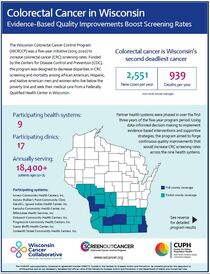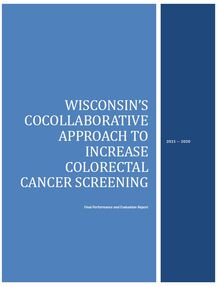Collaborative Approach to Increasing CRC Screening
About |
Colorectal cancer (CRC) is the second most common cancer diagnosed in Wisconsin and the second leading cause of cancer death among both men and women in the state. 1 Early detection and screening can detect colorectal cancer in its earliest stages increasing the success of treatment and reducing mortality (death) from the disease. In 2012, 72% of Wisconsin adults were considered ‘up-to-date’ on their colorectal cancer screening yet local Federally Qualified Health Centers (FQHCs) who serve a high population of African American, Hispanic and Hmong men and women living below the poverty line in the Milwaukee area, their CRC screening rate was around 34%.
|
Aims |
Target Population
Patients aged 50-75 years old who seek their medical care from one of the Milwaukee area FQHCs. Many of these patients are urban, African American, Hispanic and Hmong men and women living below the poverty line. Partner with all Milwaukee Federally Qualified Health Centers to increase colorectal cancer screening rates to coincide with the National Colorectal Cancer Roundtable (NCCRT) initiative of reaching 80% screening rate by 2018. Strategies include:
|
Expected Outcomes |
The overarching outcome of this national effort is to improve systems and health care practice in order to improve colorectal cancer screening. The national goal is to reach 80% screening rate by 2018.
Each partner clinic and health system will assess their situation and select the appropriate strategies to implement and evaluate. Supported Evidence Based Interventions
|
Project Materials
|
Partners |
Federally Qualified Health Center Partners
Additional Partners
|
Team |
Principal Investigator
Noelle LoConte, MD Project Staff Allison Antoine, CHES Michelle Corbett, MPH, CHES Carrie Stehman, MS David Frazer, MPH |


